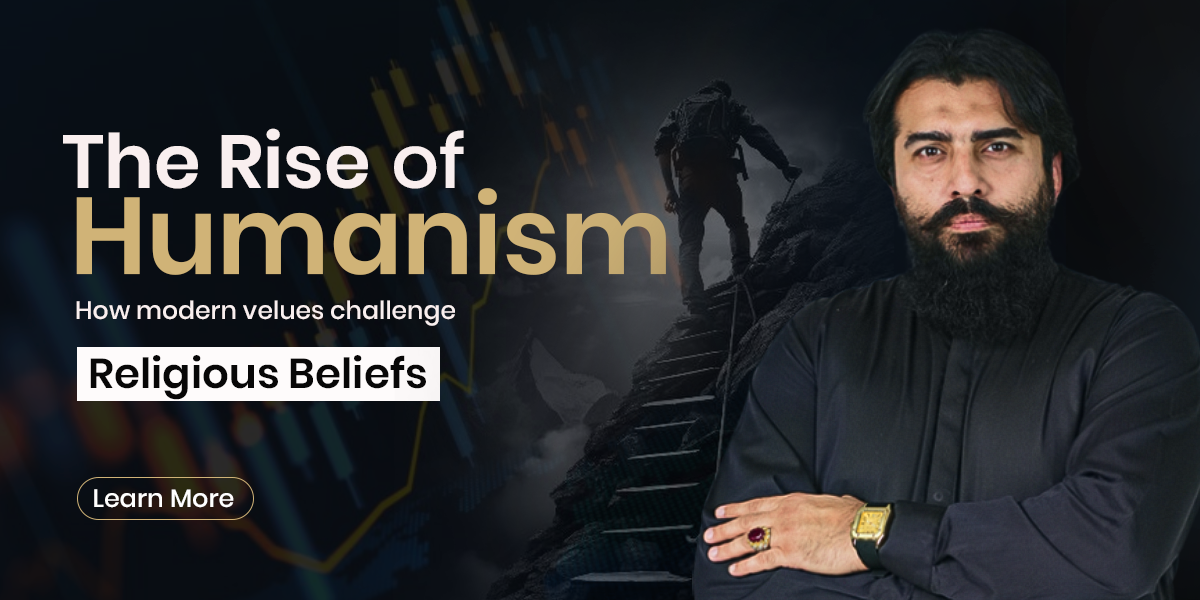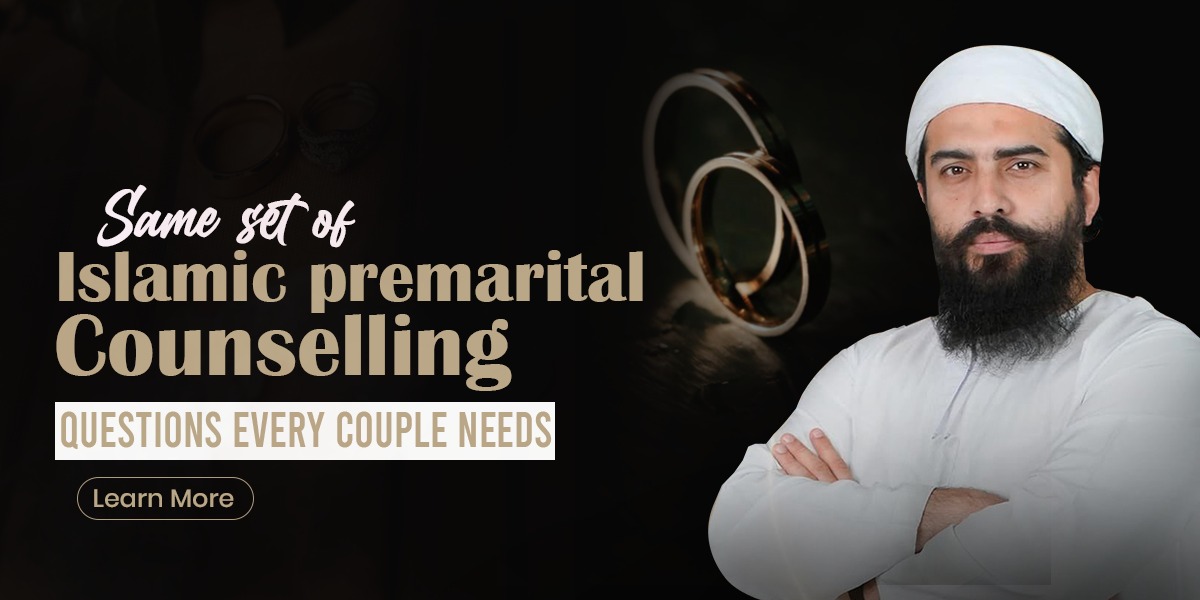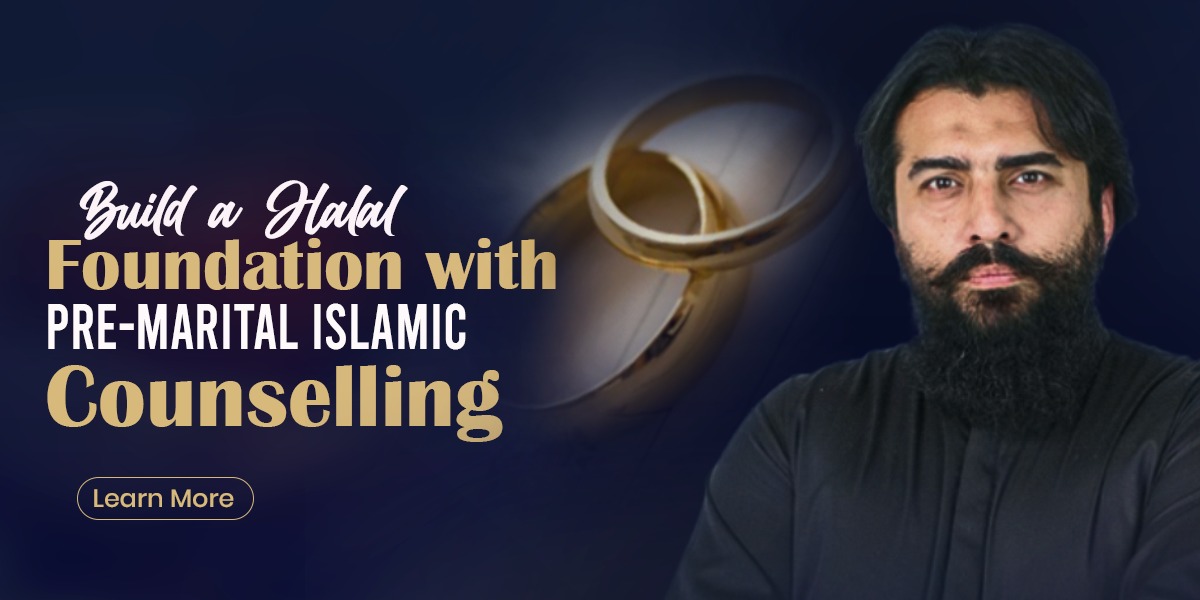Featuring Shaykh Adeel Arfeen & Shaykh Atif Ahmed
1.1. Defining Humanism
Humanism is a philosophical framework that prioritizes human welfare, rationality, and ethics without reliance on divine authority (e.g., belief in Allah). It grounds morality in human reason and collective well-being rather than religious doctrine. This secular approach challenges traditional religious paradigms by emphasizing autonomy and critical thinking over inherited faith.
1.2. Cultural Shift vs. Clash
The podcast reframes the interaction between humanism and religion as a gradual cultural evolution, not a hostile confrontation.
Key distinctions:
- Cultural Shift: A broad societal transformation where individuals reassess values (e.g., redefining morality, purpose, and community) due to globalization and modernity.
- Impact on Religion: This cultural shift has led to a decline in traditional religious practices and beliefs, as individuals increasingly prioritize personal autonomy and critical thinking over inherited faith.
- Not a Clash: This film avoids framing the dynamic as a binary “religion vs. secularism” battle. Instead, it highlights how societies adapt to new ideas organically, prompting reflection on long-held beliefs.
1.3. Drivers of Humanism’s Rise
The scholars identify four interconnected factors accelerating humanism’s influence:
- Education: Secular education fosters critical thinking, scientific inquiry, and exposure to pluralistic worldviews, encouraging individuals to question dogma.
- The Internet Democratizes information, enabling access to diverse perspectives (e.g., atheism, humanism) that challenge insular religious narratives.
- Mental Health Awareness: Prioritizes psychological well-being, leading some to critique rigid religious practices perceived as contributing to guilt or anxiety.
- Political Shifts: Secular governance and human rights frameworks (e.g., LGBTQ+ rights, gender equality) often clash with traditional religious norms, prompting debates over ethics and law.
1.4. Islamic Perspectives on Humanism
The Shaykhs explore tensions and potential synergies:
- Critiques: Humanism’s exclusion of divine authority may conflict with Islam’s emphasis on submission to Allah. Questions arise about the sustainability of morality without spiritual grounding.
- Standard Ground: Islam advocates for human welfare (e.g., charity, justice), suggesting alignment with some humanist goals. Scholars may argue that Islam’s holistic framework addresses ethical and social needs.
- Navigating Change: Strategies for Muslims to engage with humanist values without compromising faith. E.g., emphasizing Islam’s rational tradition, adapting community practices to address mental health, and leveraging technology for religious education.
1.5. “Inevitable Rethinking” of Values
The podcast emphasizes the inevitability of societal evolution, making the shift towards humanism unavoidable. Understanding the future is crucial for the audience to grasp the topic’s urgency.
- Individualism vs. Community: Humanism’s focus on personal autonomy contrasts with religion’s communal and transcendent bonds, raising questions about societal cohesion.
- Redefining Morality: If ethics are human-centric, how are universal principles justified? The scholars may critique relativism while acknowledging the appeal of empathy-based ethics.
- Religious Adaptation: Encourages religious institutions to address modern concerns (e.g., mental health, social justice) to remain relevant.
2. Humanism’s Core Values & Why They Feel Revolutionary
Autonomy
Humanism prioritises individual freedom and self-determination, rejecting external authorities (e.g., religious institutions) as the sole arbiters of truth.
- Revolutionary Impact: Challenges religious doctrines that emphasize submission to divine will or hierarchical structures (e.g., clerical authority in Catholicism or fatwa systems in Islam).
- Example: Scandinavian secularism promotes personal choice in ethics (e.g., euthanasia laws, LGBTQ+ rights) over religious prohibitions
Empathy
Moral decisions are based on shared human experience rather than divine commandments.
- Revolutionary Impact: It undermines rigid religious rules (e.g., apostasy laws and blasphemy codes) by framing ethics as situational and compassion-driven.
- Example: Norway’s focus on restorative justice (rehabilitation over punishment) contrasts with religiously influenced punitive systems.
Equality
All humans deserve dignity regardless of identity, rejecting hierarchies rooted in scripture (e.g., gender roles, caste systems).
- Revolutionary Impact: It contradicts religious traditions that codify inequality (e.g., patriarchal interpretations in Abrahamic faiths and Hindu caste practices).
- Example: Sweden’s gender-neutral parenting policies clash with religious norms about “traditional” family structures.
Science
Reliance on empirical evidence and reason over supernatural explanations.
- Revolutionary Impact: Displaces religious narratives (e.g., creationism, divine intervention) as the primary lens for understanding reality.
- Example: Denmark’s science-first education system sidesteps debates over evolution vs. intelligent design.
Why It Feels Revolutionary:
Humanism’s values disrupt millennia-old frameworks by placing humans, not gods, at the center of moral and societal progress. This shift feels radical in cultures where religion historically dictated law, identity, and daily life.
3. Where Modern Values and Religion Collide
Morality & Ethics
- Conflict: Religion asserts morality is divinely ordained and immutable (e.g., Sharia, Biblical commandments), while humanism views ethics as evolving and context-dependent.
- Case Study – LGBTQ+ Rights:
- Humanist Perspective: Rights are rooted in equality and empathy; laws should adapt to protect marginalized groups.
- Religious Resistance: Many faiths label LGBTQ+ identities as “sinful” (e.g., Catholic opposition to same-sex marriage, Islamic criminalization in some nations).
- Global Shift: 33+ countries legally recognize same-sex marriage, while religious institutions struggle to reconcile doctrine with inclusivity.
Gender and Social Hierarchies
- Conflict: Humanism rejects fixed gender roles and caste/class systems often sanctified by religion.
- Example – Feminist Movements vs. Religious Patriarchy:
- Religious Traditions: Hinduism’s historical restrictions on widows, Islam’s male guardianship laws, and Christianity’s debates over female clergy.
- Humanist Response: Movements like #MeToo and secular feminism demand accountability for systemic oppression, often framing religion as complicit.
- Tension Point: Iran’s mandatory hijab laws vs. women-led protests asserting bodily autonomy.
Science, Reason, and the Supernatural
- Conflict: Humanism’s trust in science clashes with religious claims about the supernatural.
- Key Battlegrounds:
- Creationism vs. Evolution: Evangelical Christian opposition to teaching evolution in U.S. schools.
- Climate Change Denial: Some religious groups dismiss environmental science as “secular alarmism,” prioritizing divine providence over activism.
- Faith Healing: Rejection of medical treatment in favor of prayer (e.g., Christian Scientist practices).
“What was once ‘divine mystery’ is now ‘scientific discovery’ and that shift unnerves many faith traditions.”
- Impact: As science explains phenomena like disease, astronomy, and psychology, religious explanations lose authority, creating existential crises for dogma.
4. Why Humanism Resonates in the Modern Era
A. Information Age and Critical Thinking
The internet has become the modern “tree of knowledge,” dismantling traditional gatekeepers of information. Unlike past eras, where religious institutions monopolized moral and intellectual authority, digital platforms now offer unfiltered access to diverse perspectives. This democratization fuels critical thinking:
- Documentaries and Podcasts: Works like “The God Delusion” documentary or “The Atheist Experience” podcast dissect religious dogma, encouraging audiences to question inherited beliefs.
- Influencers and Thought Leaders: Figures like Richard Dawkins and Sam Harris leverage social media to popularize secular ideas, blending philosophy with science.
- Educational Access: Platforms like Khan Academy and Coursera emphasize evidence-based learning, reducing reliance on faith-based explanations for natural phenomena.
Impact: The shift from passive acceptance to active inquiry has normalized skepticism, particularly among younger generations prioritizing empirical evidence over tradition.
B. Decline of Fear-Based Beliefs
Modern societies increasingly reject fear-driven narratives, such as eternal damnation, in favor of psychological well-being:
- Psychology Over Penance: Therapy frameworks, like cognitive-behavioral therapy (CBT), address guilt and shame without religious concepts of sin. Studies show that secular individuals often report lower anxiety about moral “failings.”
- Changing Beliefs: Surveys reveal declining belief in hell—only 59% of U.S. adults under 30 affirm its existence, compared to 70% in 2007 (Pew Research).
- Mental Health Awareness: Movements destigmatizing mental health struggles challenge religions that frame suffering as divine punishment. For example, secular support groups often replace confessional practices for coping with guilt.
Example: The rise of “exvangelical” communities, where individuals leave evangelical traditions due to trauma from fear-based teachings.
C. The Now vs. The Afterlife
Humanism’s focus on tangible, immediate challenges aligns with a globalized world facing urgent crises:
- Solving Present Problems: Movements like effective altruism prioritize climate action, poverty alleviation, and LGBTQ+ rights issues requiring urgent attention rather than deferred spiritual rewards.
- Youth Activism: Figures like Greta Thunberg embody this shift, framing climate change as a moral imperative for this life, not the next.
- Religious Contrast: While some faith groups engage in social justice (e.g., Pope Francis’ environmental advocacy), many still emphasize afterlife preparation. For instance, megachurches promoting the prosperity gospel often focus on individual salvation over systemic inequality.
Data Point: A 2023 survey found 45% of Gen Z identify as non-religious, with 72% citing “focus on real-world issues” as key to their secular worldview (Gallup).
5. The Rise of Progressive Faith: Can Religion Evolve?
A. Progressive Religious Movements
- Reformed Churches: The United Church of Christ (UCC) and Episcopal Church now ordain LGBTQ+ clergy and perform same-sex marriages, reinterpreting scripture through lenses of love and inclusion.
- Female Imams: Movements like Women’s Mosque of America and Denmark’s Mariam Mosque challenge patriarchal norms in Islam, advocating for women-led prayers and feminist Qur’anic exegesis.
- Pro-LGBTQ+ Faith Communities: Groups like Q Christian Fellowship and DignityUSA reconcile queer identities with Christianity, while Jewish organizations like Eshel support LGBTQ+ Orthodox Jews.
B. Interfaith Collaboration with Secular Groups
- Climate Action: Interfaith initiatives like GreenFaith partner with secular NGOs (e.g., Extinction Rebellion) to lobby for environmental policies, framing stewardship as a universal ethic.
- Refugee Rights: The HIAS (founded as Hebrew Immigrant Aid Society) collaborates with atheist-led groups like Humanists International to advocate for displaced populations.
- Ethical Frameworks Over Dogma: These efforts prioritize shared goals (e.g., justice, compassion) over theological differences, proving that religion can adapt without abandoning core spirituality.
Reflection:
“Can faith survive without clinging to outdated social codes?”
Progressive movements suggest yes, by distinguishing timeless spiritual principles from culturally bound rules. For example, Sikhism’s langar (free kitchen) transcends caste hierarchies, embodying equality in practice.
6. Shared Values: More Common Ground Than We Think
A. Universal Values Across Traditions
- Compassion: Buddhism’s metta (loving-kindness), Islam’s rahma (mercy), and humanist empathy prioritize alleviating suffering.
- Community: Religious congregations and secular mutual-aid networks (e.g., Buy Nothing Project) combat isolation through collective support.
- Service: Hindu seva (selfless service) and secular volunteerism share a focus on improving human welfare.
B. Humanism’s “Blind Spots” & Learning from Religion
- Meaning and Ritual: Humanists often lack communal rites for milestones (birth, death). Secular adaptations, like Humanist celebrants officiating weddings, borrow from religious ceremonial structures.
- Belonging: Churches and mosques offer built-in communities; humanist groups like Sunday Assembly replicate this with secular “congregations” for connection.
- Transcendence: Humanism rejects the supernatural but grapples with filling the existential void that religion addresses. Mindfulness practices (rooted in Buddhism) and secular meditation apps (e.g., Headspace) bridge this gap.
Key Insight: The divide between “sacred” and “secular” is porous. Both systems seek to answer fundamental human needs, such as how to live well together and face mortality.
7. Conclusion: Toward an Ethical Future Beyond Labels
Reframing the Debate
The clash is not Humanism vs. Religion but Ethics vs. Dogma.
For instance:
- Ethical Progress: Religious reformers (e.g., Quaker abolitionists) and secular humanists drove the abolishment of slavery, advancement of women’s rights, and climate activism.
- Dogma’s Cost: Rigid literalism, whether religious fundamentalism or militant atheism stifles dialogue and innovation.
The Challenge
- Preserving the Soulful: Rituals, art, and communal bonds rooted in faith traditions (e.g., gospel music, Diwali festivals) enrich culture and individual lives.
- Shedding the Divisive: Letting go of exclusionary doctrines (e.g., homophobia, casteism) contradicting modern ethics.
Final Reflection:
“What’s more important, who said it, or if it’s right for humanity today?”
- Case in Point: Islam’s historical preservation of Greek philosophy helped birth the Renaissance. Today, humanist values could inspire a similar synthesis if traditions prioritize wisdom over worship of the past.
The future of ethics lies not in picking sides but in hybrid solutions. A Hindu environmentalist citing the Bhagavad Gita’s reverence for nature, a humanist volunteering at a mosque’s food pantry, or a pastor advocating for prison reform proves that values transcend labels.
Let’s stop arguing over maps and start journeying together toward higher ground.






